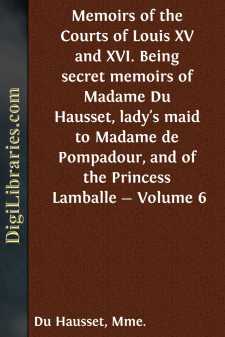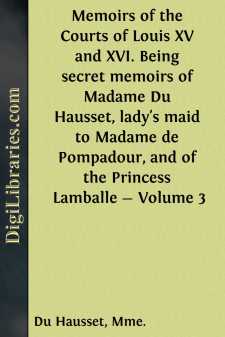History
- Africa 30
- Americas (North Central South West Indies) 50
- Ancient 68
- Asia 58
- Australia & New Zealand 8
- Canada 41
- Caribbean & West Indies 1
- Civilization 20
- Eastern Europe 12
- Europe 310
- Expeditions & Discoveries 60
- General 77
- Historical Geography 1
- Jewish 9
- Latin America 3
- Medieval 8
- Middle East 13
- Military 248
- Revolutionary 8
- Study & Teaching 5
- United States 353
- Western Europe
- World 13
Western Europe Books
Sort by:
CHAPTER XIX. The Court Travels in Picardy and Flanders.—The Boudoir Navy.—Madame deMontespan Is Not Invited.—The King Relates to Her the Delights of theJourney.—Reflections of the Marquise. The King, consoled as he was for the death of the Duchesse de Fontanges, did not, on that account, return to that sweet and agreeable intimacy which had united us for the space of eleven or twelve years. He...
more...
Louis XVI. possessed an immense crowd of confidants, advisers, and guides; he selected them even from among the factions which attacked him. Never, perhaps, did he make a full disclosure to any one of them, and certainly he spoke with sincerity, to but very few. He invariably kept the reins of all secret intrigues in his own hand; and thence, doubtless, arose the want of cooperation and the weakness...
more...
by:
A. J. Evans
CHAPTER I CAPTURE For over three months No. 3 Squadron had been occupied daily in ranging the heavy guns which night after night crept into their allotted positions in front of Albert. On July 1st 1916 the Somme offensive opened with gas and smoke and a bombardment of unprecedented severity. To the pilots and observers in an artillery squadron the beginning of this battle brought a certain relief, for...
more...
In the beginning of the spring of 1791, the King, tired of remaining at the Tuileries, wished to return to St. Cloud. His whole household had already gone, and his dinner was prepared there. He got into his carriage at one; the guard mutinied, shut the gates, and declared they would not let him pass. This event certainly proceeded from some suspicion of a plan to escape. Two persons who drew near the...
more...
by:
John David Hills
CHAPTER 1. ENGLAND. 4th Aug., 1914.25th Feb., 1915. The Territorial Force, founded in 1908, undoubtedly attracted many men who had not devoted themselves previously to military training, nevertheless it took its character and tone from men who had seen long service in the old Volunteer Force. Hence, those who created the Territorial Force did nothing more than re-organise, and build upon what already...
more...
They are forever talking about the coquetry of women; men also have their coquetry, but as they show less grace and finesse than we do, they do not get half as much attention. The Marquis de Lauzun, having one day, noticed a certain kindly feeling for him in the glances of Mademoiselle, endeavoured to seem to her every day more fascinating and agreeable. The foolish Princess completely fell into the...
more...
1. Heliopolis Camp. (Visited on January 2, 1917.) This camp is laid out quite close to the new city of hotels and villas founded in 1905 under the name of The Oasis of Heliopolis. The camp site is 134 feet above the level of Cairo. Strength.—3,906 Turkish non-commissioned officers and men. 3 Turkish soldiers of the Sanitary Corps. 2 Armenian doctors (officers in the Turkish Army). The camp is...
more...
by:
Mme. Du Hausset
"The dismissal of M. Necker irritated the people beyond description. They looked upon themselves as insulted in their favourite. Mob succeeded mob, each more mischievous and daring than the former. The Duc d'Orleans continued busy in his work of secret destruction. In one of the popular risings, a sabre struck his bust, and its head fell, severed from its body. Many of the rioters (for the...
more...
by:
Mme. Du Hausset
INTRODUCTION. I should consider it great presumption to intrude upon the public anything respecting myself, were there any other way of establishing the authenticity of the facts and papers I am about to present. To the history of my own peculiar situation, amid the great events I record, which made me the depositary of information and documents so important, I proceed, therefore, though reluctantly,...
more...
by:
Anonymous
The present period is so distinguished for historical research, that the publication of an English Chronicle, written in the fifteenth century, will not it is presumed require any other prefatory remarks to recommend it to attention, than a brief account of the MSS. from which it has been transcribed. Two copies are extant in the British Museum; the one in the Harleian MS. 565, the other in the...
more...











